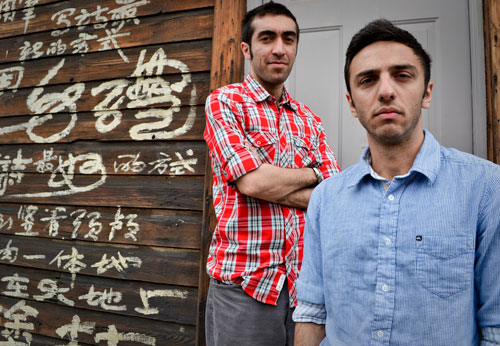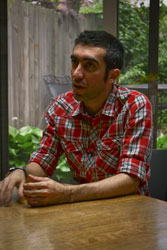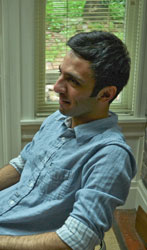“To break free and confront the world”: The Casualty Process Interview
by Joshua Barnes / July 11, 2012 / No comments
The Casualty Process is a two-piece electro-rock band that churns out anthemic guitar riffs and swirling vocals backed by drum machines and hypnotic bass. With their music the Casualty Process wants you to wake up, get down, and work to change the world. If you ask Shayan Amini and Natch Nadjafi, who have been playing together since 2001, about their music, they’ll say, “Our music is powerful – it is fighting music and we want people to have this feeling to continue and be strong.”
In Iran, where they are from, they were labeled “Satanists” when the Iranian authorities busted them for playing an outdoor concert in 2007. Shayan and Natch were arrested along with their parents and over 200 other people in attendance.
Since then, the Casualty Process have gone through a lot of changes: They modified their sound, simplified their lineup, and eventually moved to New York in April 2011. In the last year they have released an EP, toured the United States, appeared at a TedX conference in Florida, and played at City of Asylum/Pittsburgh’s Exiled Voices of Iran event on May 5.
That day Sampsonia Way sat down with the Casualty Process. In this interview Shayan and Natch talk about the N! Festival where they were arrested, the feelings behind their music, and where one can go to buy a guitar and illegal CDs in Tehran.
Can you take me to the scene of the N! festival in 2007? What happened? What was the chain of events that led to your arrest?
Natch: The story is so simple: We had a rock band and we were trying to be heard—like every other single band in the world. When we started, there were some institutional venues where we could play our music under the title of “educational concert.”
After 2005, all of the institutes and venues were closed, but we didn’t want our story to end like that. We thought that we could organize underground gatherings for our friends. We did it a few times and the last one was the N! gathering. Because previous concerts went well, we planned for two hundred people. Fortunately, or unfortunately, more than seven hundred people showed up. We lost control and everything went wrong.
Did you get to play the show?
Shayan: Yeah, the show was over and suddenly the police stormed inside the garden and arrested two hundred and forty people. The rest just ran away.
Natch: Actually, we should thank the police, because they let us play the whole set.
Shayan: That was cool.
Natch: “Okay we’ve finished, you can arrest us now.” (laughter)
In the shows prior to this, where did you usually play?
Natch: We played at people’s houses—
Shayan: But out of the town in a very safe places.
Natch: This one was in a garden, with an outdoor stage and we thought it was safe too, but we made a big mistake.
Shayan: We told our friends about the show two or three months before. That’s why so many people knew about it.
Natch: The music scene in Iran is not like the music scene in the United States where tons of bands play on the same street in any given night. If you have a show in Iran, it’s underground but half of the city knows about it, so it’s not very difficult for the authorities to find out what you are doing. But that was a risk we had to take.
You were arrested and imprisoned for fifteen days.
Shayan: Our parents were in jail too—but only for two days—because they were also at the show. They fined them $50,000 and took the deeds to our houses to let us go.
There were many other musicians imprisoned with you. Did you play music in jail?
Natch: In the morning we had to go to the prison yard to run around. When we got tired we used to sit in the corner and play music with our mouths. It was cool, but we couldn’t play real instruments.
Shayan: Another thing that was interesting was the label the police gave us. They called us Satanists. The prisoners were really eager to see those Satanists, and when they saw us, they were like, “What? You?” It was really funny and terrible.
They were almost disappointed. “Where are the tattoos and piercings and crazy haircuts?”
Shayan: (laughter) Exactly.
What is the significance of your song, “Reveille”? Who were you telling to wake up and who is the war against?
Natch: We try to write our music in a general way so everyone can connect with it. When we were writing that song, we were fighting with ourselves. I felt like I was isolated from everything; I wanted to break free and confront the world. You’ve got to be Iranian to feel what I am saying. At the time it was like a war with the whole world, but the song can mean something different to everyone. It completely depends on you.
What do you mean “isolated from everything”? How would you describe that isolation?
Shayan: You only need to have an Iranian passport…
Natch: Media censorship, religious restrictions, cultural limitations, social beliefs, and an unclear future all make us feel insecure. That’s probably why we are on guard about the world around us. It’s like being afraid of an unknown and wild world that needs to be tamed.
“We tell our stories and we want people to know how brave we are. Not “we” as in Shayan and myself, but Iranian artists, Iranian people.”
Would you guys say that you are a political or protest band?
Natch: If you’re Iranian, automatically you’re political. As I mentioned, we didn’t try to be political. Yes, we are a protest band, and as human beings who want to be free, we are protesting whatever it is that’s going to try and stop us.
Shayan: We didn’t want to be in this situation, but they put us here.
Natch: It’s complicated. We don’t cry, “Why?” I don’t want people to get it wrong and think that we’re sad, that we’re complaining. We are not complaining. We tell our stories and we want people to know how brave we are. Not “we” as in Shayan and myself, but Iranian artists, Iranian people. We are fighting for our rights. Someday we will have them. Unfortunately a lot of people get it wrong and think that we are here just to tell a story and that we just want people to listen to us without follow-up and everything is done. No, we don’t want that.
What kind of effects or changes would you like to see as a result of your music? What do you want people to take from it?
Natch: When you listen to our music, you will find aggression in it. This is what is in our soul. It gives us the energy to fight; it is powerful. We want people to have this feeling and the strength to continue. Maybe the change that they want to happen is going to take one hundred years. But if they fight for their rights, for their life, at the end of the day they can say with satisfaction, “At least we tried. At least we followed through with that.”
The hope that you allude to there is also present in the music. Do you use computers and drum machines as a stylistic choice or necessity?
Natch: That story is so funny. After we were arrested the government took every instrument we had. So when I got home from jail, I stepped into my room, looked around and there was nothing except for a computer. I said, “Why not? Let’s make electronic music!” That’s how it started. I love electronic music and that was the time to start making it. Then I bought drum machines and MIDI controllers. After awhile I thought, “Okay that’s good, I like it, let’s continue,” and I invited Shayan into the band. The combination that we have now wasn’t the initial plan. It formed during the process.
Some people believe that rock music doesn’t fit so well in countries like Iran, not only because of the politics, but also because the culture is so attached to religion. What is your answer to them?
Shayan: That’s the wrong image. You should just go to Iran. When you meet people, you’ll see that you cannot believe the news at all. Nowadays, most young people don’t care about that image and their reaction to religion has changed. You should feel it, you should be there. All I can say is that is the wrong image. That’s it. You shouldn’t trust the news; they are liars.
Where would I go to buy an electric guitar in Tehran?
Shayan: There is a famous street called Jomhouri where you can find anything you want. We bought our instruments there—except that Gibson Les Paul. I bought that in the United States.
Natch: If you need a special guitar that you cannot find it in Tehran, you can still buy it, but you’ll pay lots of money and after a period of time they can take it. The shops there buy the guitar from somewhere else and then they have to find somebody to bring the guitar into the country. It’s a long process.
Shayan: Plus, because of the sanctions, the prices are about double.
Natch: For example, the guitar that Shayan bought here…
Shayan: You’d pay roughly $5,000 dollars for it in Iran.
What has enabled you to persevere? You’ve been playing music since 2005?
Shayan: No, since 2001.
Natch:We are following Pearl Jam (laughter). For sure that’s the music that give us the energy to continue, and inspired us to speak to people around the world with our music. That’s the life we chose to live and we know how to survive.
Shayan: We are trying to follow them. At the N! festival show we were just covering the hits from bands like Sound Garden, Nine Inch Nails, Pearl Jam, Audioslave, the Red Hot Chili Peppers, A Perfect Circle, and Creed.
“When you are not allowed to know, see, listen, or go to different places outside of your country, you will be curious.”
Talk about the ways that you heard the music you just listed?
Natch:There are lots of ways. When I was a child there were tapes, but not very many. People who traveled to foreign countries would bring tapes and we would pass them around. I had a Blood Sugar Sex Magik tape.
When we grew up a little bit, there was the internet. But it was slow. Instead of downloading an album in fifteen minutes, in thirty minutes, we did it in two days or a week. We had it at the end, though.
Shayan: When you are facing the limitations that we faced, when you are not allowed to know, see, listen, or go to different places outside of your country, you will be curious. When you are really free and you have everything, maybe you won’t be as curious about everything. That is why we were able to find that music. We wanted it, we needed it.
Natch: I forgot the most important source we had. There were four or five secret shops in Tehran that were apparently selling computer stuff, but behind closed doors they were a big source of music. I remember they had a book, maybe five-hundred pages, that listed all the bands in the world we could imagine. You decided what you wanted and after one or two days you came back and they’d have your CDs.
We don’t have copyright law in Iran, so it was cheap—twenty albums on a CD for maybe two dollars. I probably listened to more music than you, it was so cheap. (laughter)
Have you guys thought about adding traditional Iranian music to your sound at all?
Natch: No.
Shayan: No, I don’t think so (laughter). We would love to, but I think it doesn’t make sense. I don’t know, we haven’t tried it.
Natch: We don’t deny Iranian music. My father is a great singer. He was not educated in the traditional music industry, but he sings traditional songs. He has great potential and a great voice. He’s sung since I was a kid. I don’t know what happened to me; I experienced lots of music when I was a child. My mother used to listen to old pop music too. I liked the music, but it wasn’t the thing that I was looking for. I remember, when I was fifteen or sixteen one of my friends gave me a Metallica album, Justice For All, on tape. I liked it because it was different. Then I started to listen to Iron Maiden and other heavy metal bands.
Shayan: I think the reason we didn’t think about mixing the traditional music of Iran with our music is because we listened to that music a lot when we were in Iran. We wanted to make something new, even for ourselves.
Natch: Lots of people have done traditional music. We didn’t want to do something that…
Shayan: Someone did before.







